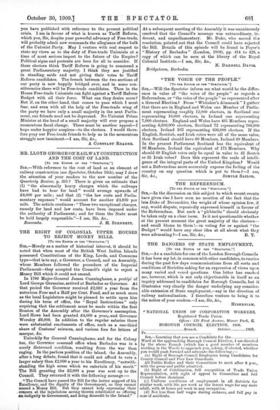THE RIGHT OF COLONIAL UPPER HOUSE S TO REJECT MONEY BILLS.
[To TEE EDITOR OF THE "SPECTATOR.")
gm,—Merely as a matter of historical interest, it should be noted that when most of the British West Indian Islands possessed Constitutions of the King, Lords, and Commons type—that is to say, a Governor, a Council, and an Assembly, whose Members followed the procedure of the Imperial Parliament—they accepted the Council's right to reject a Money Bill which it could not amend.
In 1780 Major-General James Cunninghame, a protégé of Lord George Germaine, arrived at Barbados as Governor. At that period the Governor received £2,000 a year from the notorious Four and a Half per Cent. Fund, and as much more as the local Legislature might be pleased to settle upon him during his term of office, the "Royal Instructions" only requiring that the settlement must be made within the first Session of the Assembly after the Governor's assumption. Lord Howe had been granted £4,000 a yeare. and Governor
Worsley 26,000. In addition to the regular salaries there were substantial emoluments of office, such as a one-third share of Customs' seizures, and various fees for letters of marque, Ac.
Unluckily for General Cunninghame, and for the Colony .too, the Governor assumed office when Barbados was in a sorely distressed condition, resulting from the war then raging. In the parlous position of the island, the Assembly, after a long debate, found that it could not afford to vote a larger salary than £2,000 a year to his Excellency, "notwith.
standing the high sense which we entertain of his merit." The Bill granting the £2,000 a year was sent up to the CounciL They returned it with the following message
"The Council have passed the Bill for the .better support of his Ficellency, and the dignity of the Government, as they cannot amend a Money BM. But they cannot help expressing their . concern at the injudicious saving therein established as offering on indignity to Government, and doing discredit to the Island.'
At a subsequent meeting of the Assembly it was unanimously resolved that the Council's message was extraordinary, in- decent, and unparliamentary. Mr. Duke, who moved tl.e resolution, pointed out that the Council could have rejected the Bill. Details of this episode will be found in Poyer's "History of Barbados" (London, 1808), pp. 414 to 428, a copy of which can be seen at the library of the Royal Colonial Institute.—I am, Sir, &a., Bridgetown, Barbados. N. DARNELL DAVIS.










































 Previous page
Previous page